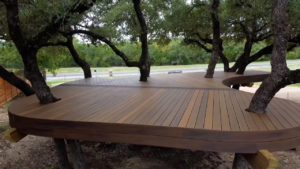What is a Floating Deck?
By Dave Kile You may have heard the term before, but what exactly is a floating deck? I have experience with all sorts of decks – from contemporary composite to traditional decks – and I can tell you that floating decks are a worthwhile consideration for your deck build.
You may have heard the term before, but what exactly is a floating deck? I have experience with all sorts of decks – from contemporary composite to traditional decks – and I can tell you that floating decks are a worthwhile consideration for your deck build.
A floating deck, also known as a freestanding deck, is built away from a structure. You might place it in the middle of a yard, adjacent to a patio, or near another structure, such as a pergola or a pool. The floating deck rises only a foot or two off the ground, is an outstanding DIY project, and is perfect for those who want to upgrade their patio or deck area.
We’ll look at the benefits and drawbacks of floating decks, the basics of constructing them, and the types of material you can use. I will also illustrate a few lesser-known facts about floating decks and why they are an excellent tool for homeowners wanting to expand their backyard outdoor space.
What is a Floating Deck?
 As mentioned, a floating deck is typically constructed in a grassy area. It is an easier home improvement project than a fixed or raised deck. A floating deck can also be built over an old patio. At Trex, we have seen many newly constructed freestanding or floating decks. They have enhanced our customers’ time outside. Plus, low-to-the-ground floating decks are a brilliant alternative for those who do not wish to have deck stairs to navigate up and down and for those who frequent their garden.
As mentioned, a floating deck is typically constructed in a grassy area. It is an easier home improvement project than a fixed or raised deck. A floating deck can also be built over an old patio. At Trex, we have seen many newly constructed freestanding or floating decks. They have enhanced our customers’ time outside. Plus, low-to-the-ground floating decks are a brilliant alternative for those who do not wish to have deck stairs to navigate up and down and for those who frequent their garden.
Floating Deck: Pros and Cons
Let’s check out some of the advantages and disadvantages of floating decks. I’ll explain a few facts that may help steer your decision regarding deck design.
Pros
Besides being easy to access, floating decks are more like a platform (and less like a raised deck). There are several other pluses to installing this type of deck.
- Floating decks are fast and easy to construct, often less expensive than traditional decks.
- They can’t damage the structure since they’re not affixed to a building.
- They can be relocated to a different area of your outdoor space.
- Usually, no permits are needed since the supporting concrete piers do not penetrate the ground.
Cons
- Weed growth could be a potential problem underneath the deck. This can be remedied with landscape fabric and gravel.
- The soil could shift and possibly impact the layout and deck frame.
- Care needs to be taken to distribute the weight evenly in the construction process.
- A ground-level deck will give you less return on investment than a traditional one.
I recommend using a paver base or a concrete pad below a floating deck during excavation to help address any erosion problem. As you can see, a floating deck is a smart choice, whether it’s an addition to your existing deck or a completely new endeavor.
What are the typical uses of a floating deck?
 Where to start? Unlike a fixed deck, you can build a floating deck near the “other side” of your backyard. If you happen to have a favorite shade tree or flower garden where you like to spend time, this is an ideal place for a floating deck install.
Where to start? Unlike a fixed deck, you can build a floating deck near the “other side” of your backyard. If you happen to have a favorite shade tree or flower garden where you like to spend time, this is an ideal place for a floating deck install.
Do you have a picnic table but don’t want it to take up room on your patio next to the house? Construct a floating deck so you can enjoy eating in nature. Also, floating decks are a prime pairing next to a pool. A fire pit is another option to utilize on a freestanding deck. Make sure to use a pad under it.
Another idea is if you have friends or family members who like to make music, a floating deck is a perfect platform stage where they can play. Be sure any electrical cables and cords are securely tied down.
Fixed vs Floating Deck: Which is Better?
 Choosing a deck style really comes down to personal preference. When most people think of a deck, they think of an extended living space through a sliding glass or back door directly out of their home. Raised decks usually have a beautiful view and are an excellent way to enjoy the sun (or shade), and they often provide an ample area underneath for storage or a covered patio.
Choosing a deck style really comes down to personal preference. When most people think of a deck, they think of an extended living space through a sliding glass or back door directly out of their home. Raised decks usually have a beautiful view and are an excellent way to enjoy the sun (or shade), and they often provide an ample area underneath for storage or a covered patio.
A floating deck, which is more simplistic, is about creativity. You will definitely still be able to get that “deck feeling” while enjoying nature – just a little bit closer to the ground! We have seen families design their decks for various purposes. Some families will choose to have a railing-free floating deck dedicated to their children’s play area.
Something to note about floating decks: Normally,
you would not have to call the building department of your city or county to learn about building codes and construction permits. This makes the deck build process quicker and less expensive, and you can enjoy your deck much faster! You can construct a traditional or floating deck from composite decking, such as Trex or pressure-treated wood. Hardwoods like pine and redwood are popular choices for floating decks. If you are building your deck out of wood, apply butyl tape to the joist and beams, clean regularly, stain if desired, and seal.
FAQ
Will a Floating Deck Shift or Move?
 Generally, a floating deck will not move. Because it is a heavy structure and your contractor (or you) will take care in its build, floating decks are securely placed on the ground. At the start of a floating deck installation, your contractor will level the ground, place a weed barrier, and use special concrete blocks, or TuffBlocks, to prep the area. After that part of the process, the supporting frame is built to hold the weight of the deck boards. A small piece called a joist hanger is primarily responsible for this large task.
Generally, a floating deck will not move. Because it is a heavy structure and your contractor (or you) will take care in its build, floating decks are securely placed on the ground. At the start of a floating deck installation, your contractor will level the ground, place a weed barrier, and use special concrete blocks, or TuffBlocks, to prep the area. After that part of the process, the supporting frame is built to hold the weight of the deck boards. A small piece called a joist hanger is primarily responsible for this large task.
All of these precautions will hold the deck in place. However, the deck can still be relocated relatively easily if desired.
How Much Weight Can a Floating Deck Hold?
This is a great question – and a very important one. A floating deck will hold about 50 pounds per square foot if built correctly. For example, a 10′ x 12 ‘deck, equivalent to 120 square feet, will hold roughly 6,000 pounds. This is an approximation for these purposes.
It’s vital to remember that the middle of the deck is always its weakest point. By making sure the deck’s surface boards, fasteners, deck screws, and footings are in good shape, you will worry less about weight and think more about fun!
A Few Final Thoughts
Before embarking on a project such as a floating deck build, compare and contrast your options. You may have a perfect spot under a huge tree, which would lend itself to a floating deck. Remember to ensure that conditions are optimal for deck placement. Check to make sure you have a good base on which to start (like a level ground) and that your trees or vegetation are cooperative. (In other words, you’re not setting up under a walnut tree!) Keeping these few things in mind while you build means you’ll ultimately have an attractive area with an amazing deck so you can enjoy nature!
